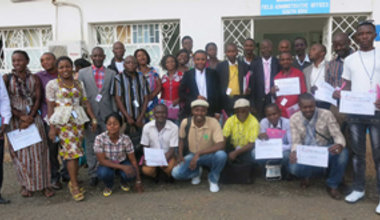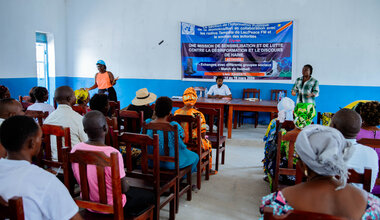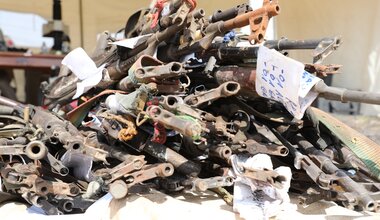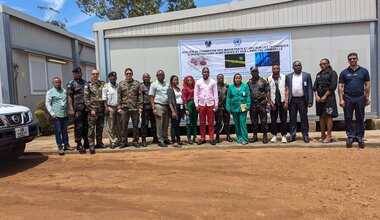35 Journalists in South Kivu Attend Refresher Training Workshop at MONUSCO

MONUSCO in South Kivu held, from 28 to 29 October 2014, a refresher training workshop for 35 journalists from across the province. The workshop was designed to strengthen the journalists’ ability to communicate information dispassionately without distorting the facts, and to enable them to revisit the principles that direct their profession.
And that is, seeking and reporting the truth with rigor, accuracy, integrity, fairness and accountability. Topics discussed included journalistic ethics and principles, the practice of journalism in a post-conflict or conflict situations, the relationship between the media and the politico-administrative and military authorities, and Gender and the Media.
This two-day workshop is critically important because it also contributes to improving relations among journalists, leading to greater solidarity and cooperation among them as well as greater professionalism in their practice. Indeed, the unethical behavior of one journalist may damage the reputation of the entire profession, and indirectly disserve le public. Journalists, therefore, have the duty to inform while respecting the public’s interest and right to know. Moreover, they must practice their profession with respect for the private life of individuals, and have a moral obligation to protect their sources of information. Achieving this remains a daily challenge for the media, especially in the context of post-conflict or conflict-stressed countries. And this mission becomes nearly impossible when the media are controlled by the parties in conflict or by the political authorities.
To overcome these challenges, the workshop participants recognized the need for a change in behavior based on a better understanding of journalism ethics and principles, coupled with improved knowledge about journalistic writing, production of television news programs with accompanying images, as well as the promotion of women in the media, and a greater involvement in electoral cycles.
As to the practice of journalism in times of conflict, the participants agreed that journalists should not rely solely on their training and observance of the principles governing the profession in order to be able to overcome the difficulties facing them and to disseminate the fairest and most accurate information possible. They should in addition strive to contextualize the conflict, humanize it, and identify, beyond the causes cited by the leaders or authorities, the underlying interests to help all parties involved to have a clear understanding of the stakes.
Also, the 35 participating journalists criticized the attitude of some of their colleagues towards public authorities or some local personalities. A journalist must exercise prudence in his/her relations with public authorities. Indeed, when a journalist accepts bribes or favors from any authority or person, he/she must be aware of what this authority or person may expect from him/her immediately or later.
Biliaminou Alao/MONUSCO
 ONU
ONU Nations Unies Maintien de la paix
Nations Unies Maintien de la paix




